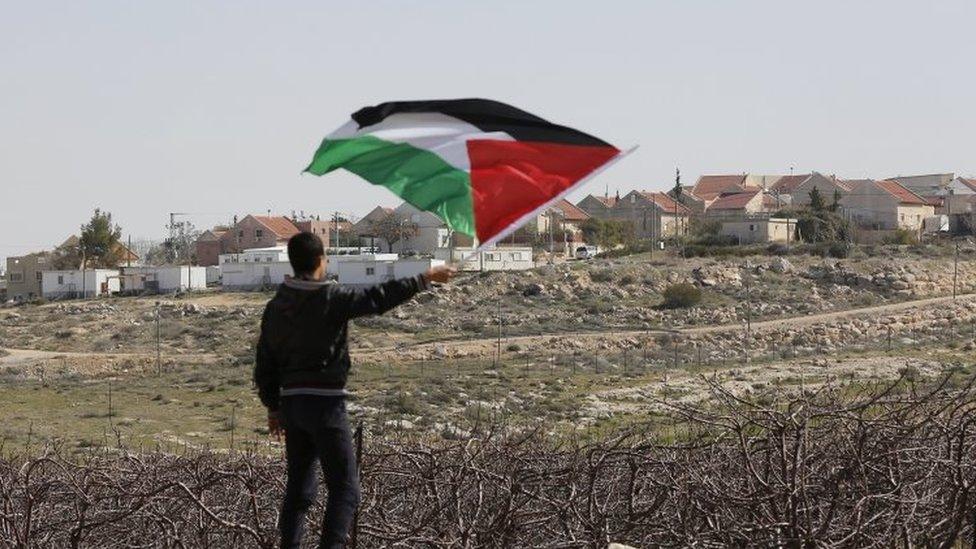PJ Crowley: Trump unveils a subtle but vital shift in US policy
- Published
Trump and Netanyahu - in 90 seconds
A playful exchange between President Donald Trump and Israeli Prime Minister Benjamin Netanyahu actually said a great deal about the dim prospects of a successful negotiation with the Palestinians under current circumstances.
"I think we're going to make a deal," President Trump said on Tuesday as he rolled out the red carpet for Mr Netanyahu at the White House.
The contrast in the tone of the US-Israeli relationship was tangible given the well-documented tension between Mr Netanyahu and Mr Trump's predecessor, Barack Obama.
"It might be a bigger and better deal than people in this room even understand. That's a possibility," Mr Trump added. "So let's see what we do."
"Let's try," responded Mr Netanyahu. When Mr Trump chided him for not sounding sufficiently optimistic, the prime minister quipped, "That's the 'art of the deal'."
Actually, it's the reality of the Middle East peace process, a hall of mirrors with a grim regional reality, a host of historical grievances, and zero-sum politics that make the odds of a meaningful negotiation remote, much less an actual agreement.
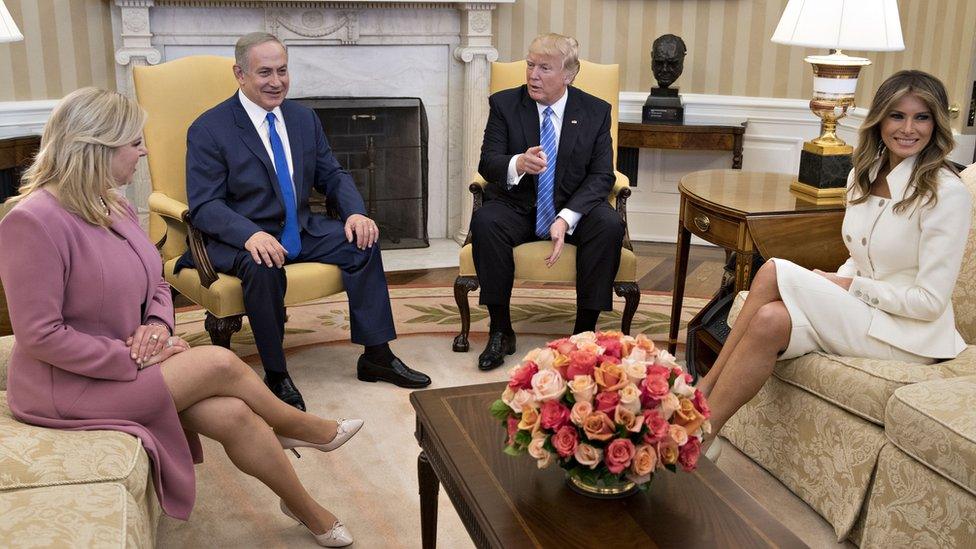
US President Donald Trump and Israeli Prime Minister Benjamin Netanyahu, here next to wives Melania and Sara
Notwithstanding the obvious chemistry between Mr Trump and Mr Netanyahu - and a longstanding personal connection between Mr Netanyahu and Mr Trump's designated Middle East envoy and son-in-law, Jared Kushner - there is no chemistry between the Israeli leader and his Palestinian counterpart, President Mahmoud Abbas.
"As with any successful negotiation, both sides will have to make compromises," Mr Trump observed correctly.
However, the parties themselves are farther apart on the substance of the process - the borders of a Palestinian state, Israeli security arrangements within a Palestinian state, the right of return for Palestinian refugees and the status of Jerusalem - than they were at the end of the Clinton administration.
Both the Bush and Obama administrations expended considerable effort to close existing gaps and achieve at least a framework agreement that would set the stage for a final deal. Neither was successful. Obstacles were less about substance than politics.
The centre of Israeli politics has moved markedly to the right; the left that embraced the essential bargain of the Oslo process, land for peace, has receded.
The existing Israeli governing coalition is not wired to make concessions. In fact, it is pushing Mr Netanyahu to increase the settlement presence in the West Bank while accelerating construction in East Jerusalem.
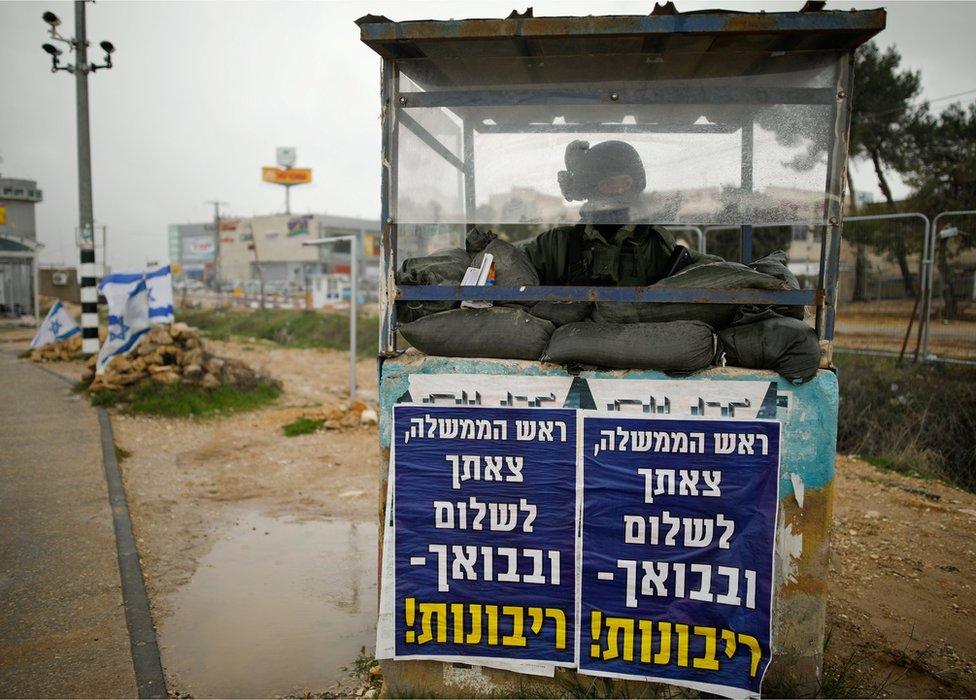
An Israeli soldier stands inside a guarding booth in the Gush Etzion Israeli settlement block in the occupied West Bank
In 2009, the Obama administration demanded a freeze to all settlement activity. Israel reluctantly agreed, although some growth continued within settlements Israel would keep in any final deal.
Rather than accelerate negotiations, settlements became a bone of contention within them. When the 10-month settlement moratorium ended, so did direct negotiations.
Secretary of State John Kerry tried to achieve a framework agreement during Mr Obama's second term, but his one-year effort fell short.
In a parting shot at Israel, when a resolution came before the UN Security Council declaring settlement activity to be an impediment to peace, the Obama administration abstained.
President Trump criticised the "unfair and one-sided" treatment of Israel at the UN, a gesture Mr Netanyahu welcomed.
Days before the meeting, the Trump White House cautioned the Israeli government that expansion of settlements beyond their existing borders was not helpful.
Mr Netanyahu may moderate the current pace of settlement activity but he is not going to stop it. The Palestinians will continue to see settlement activity as a fundamental problem.
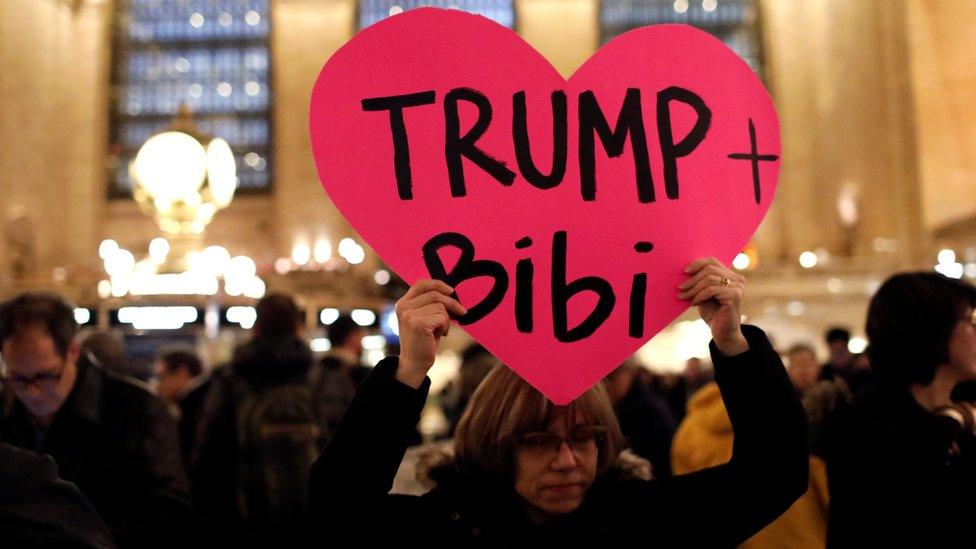
A woman in the US during a "Muslim and Jewish Solidarity" protest. Mr Netanyahu is nicknamed "Bibi"
The Palestinians are deeply divided. In 2006, Hamas won an unexpected majority of seats in the Palestinian legislature over Mr Abbas' Fatah Party. The Palestinians have lacked political unity ever since.
Today, Hamas, not the Palestinian Authority, is the de facto government in Gaza. Full elections have not been held in more than a decade.
The bottom line is that both sides prefer the status quo to making the politically painful concessions that a negotiation would require.
Both Mr Trump and Mr Netanyahu hope to pursue an "outside-in" strategy, building on shared regional concern regarding Iran and radical extremists including the Islamic State group to create momentum to solve the Israeli-Palestinian conflict.
While reasonable in theory - Mr Netanyahu spoke of partnership with Arab states in opposition to Iran - co-operation at the governmental level does not necessarily translate to popular support. For many in the region, the plight of the Palestinians continues to resonate.
Given the limited prospects confronting a two-state solution - progress that likely requires different leaders and mandates on both sides - President Trump made a small, but significant adjustment in US policy, expressing a willingness to support a one-state solution if both parties agree.
But the two sides have very different visions of what a one-state solution looks like.
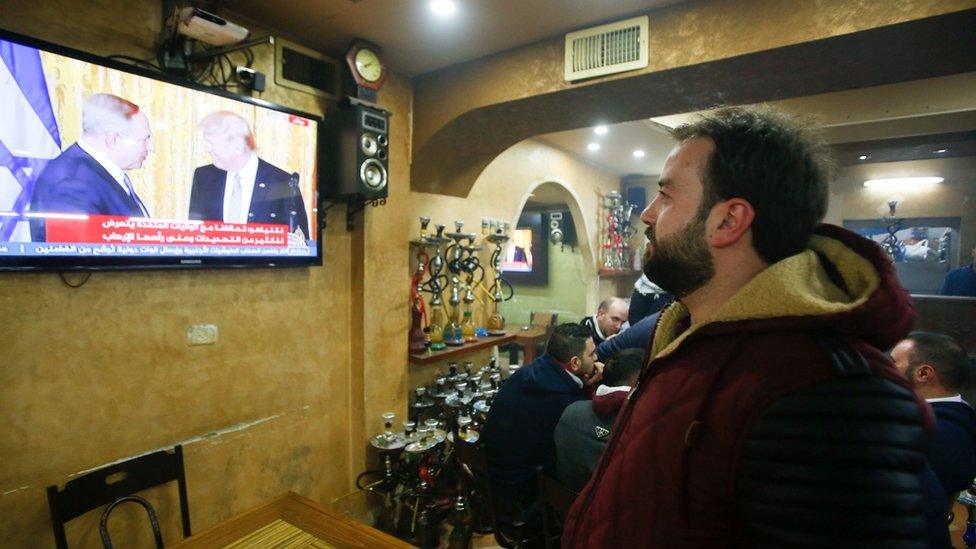
A Palestinian man watches a joint press conference in the West Bank city of Hebron
A key Netanyahu prerequisite for any deal is preservation of Israel as a Jewish state.
On the other hand, in any agreement, Palestinians would insist on citizenship, voting rights and a government of and for the people - all of them. This could redefine Israel's identity.
President Trump may see his one-state acknowledgement as the opening gambit in a lengthy negotiation.
But a one-state solution potentially presents Israel with an existential choice. It can be a Jewish state or a democracy, but not both.
That is a choice the United States has never wanted Israel to confront since the answer could have grave implications for the US-Israeli relationship.
PJ Crowley is a former U.S. Assistant Secretary of State and now a Professor of Practice at The George Washington University and author of Red Line: American Foreign Policy in a Time of Fractured Politics and Failing States.
- Published15 February 2017
